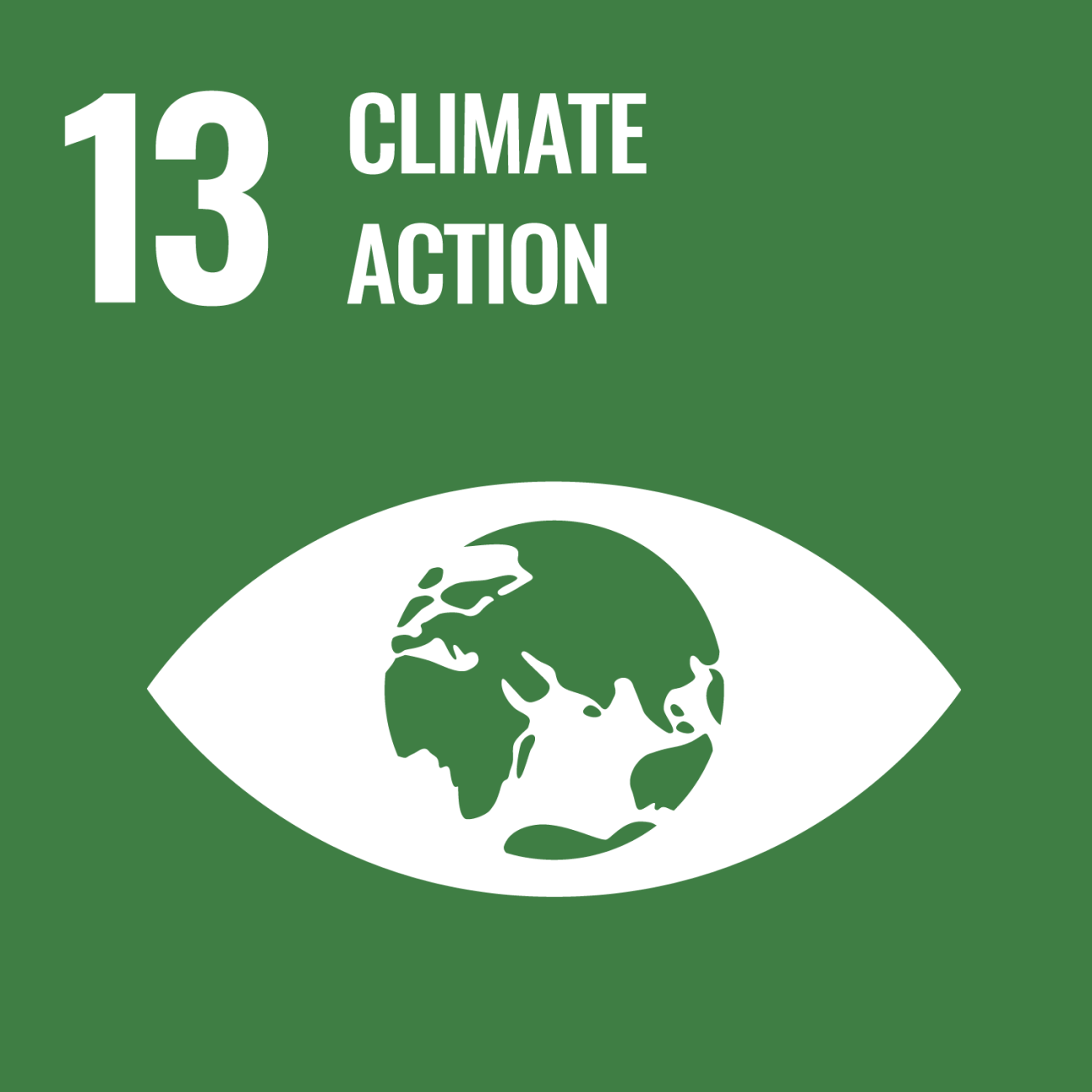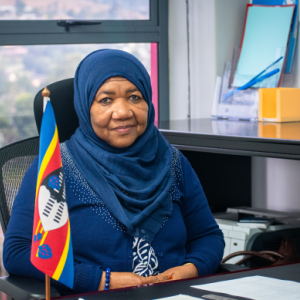Immediate and Ambitious Action is Required to Protect our People and Planet from Climate Change

Op-Ed by the Acting UN Resident Coordinator, for the month of November 2021.
In 2015, World Leaders adopted the 2030 Agenda for Sustainable Development and its 17 Sustainable Development Goals (SDGs). The 17 SDGs call for action by all countries to promote prosperity while maintaining peace, protecting the planet, the people and building partnerships. With only ten years remaining to achieve these goals, countries are accelerating steps towards ending poverty, fighting inequalities, tackling climate change, and ensuring that no one is left behind. Every month, the United Nations places one of the 17 SDGs under the spotlight, highlighting its purpose, targets, and criticality in advancing Agenda 2030. This month’s focus is Goal 13: Take urgent action to combat climate change and its impacts.
BY AMINA MOHAMED
“Success or failure is not an act of nature. It’s in our hands…As the great Scottish writer Robert Louis Stevenson said: ‘Don’t judge each day by the harvest you reap, but by the seeds that you plant.’ We have many more seeds to plant along the path.” – UN Secretary-General, Mr António Guterres, at the UN Climate Change Conference in 2021 (COP26).
With eight years remaining to achieve Agenda 2030 for Sustainable Development, the urgent need to realise Sustainable Development Goal (SDG) 13; ‘Climate Action’, is greater than ever before.
Alarmingly, 2019 was the second warmest year on record, with carbon dioxide (CO2) levels and other greenhouse gases in the atmosphere rising to new records.
Climate change is impacting all people, in every country. Local and global economies are being severely affected by its harmful impacts, livelihoods are at risk, and sea levels are rising, whilst weather patterns evolve and become more extreme.
Despite the drop in greenhouse gas emissions of approximately six (6) percent in 2020, due to global lockdowns and travel bans to fight the COVID-19 pandemic, this improvement remains temporary. As lockdowns and travel bans lift, climate change is expected to accelerate quickly: an emergency that we can no longer ignore.
Thus, in 2015, UN Member States adopted the Paris Agreement, which seeks to strengthen the world’s response to the threat of climate change, by ensuring a rise in global temperature that remains below two degrees Celsius. Significant to the Agreement, is the strengthening of capacity of countries to respond to climate change, through the availability of finances, and a new technology and capacity-building framework.
However, the realisation of the Paris Agreement requires an immense sense of commitment and global solidarity: such which has been witnessed throughout the world during the COVID-19 pandemic. The globe, continents, nations, and individuals have united to fight the common enemy that is the coronavirus, in ways that we have not seen in recent history.
It is with this same spirit that we must approach the battle against climate change, for lives have never been at greater risk than today. Thus, our recovery from the COVID-19 pandemic presents a unique opportunity to ensure that a significant focus is placed on the preservation of biological diversity and our environment.
We only have one planet Earth to protect and on which to enjoy the fulness of life.
During the COVID-19 pandemic, plastic pollution has dramatically increased. As Personal Protective Equipment (PPE), including disposable masks, gloves, overalls, hand sanitizers and more, were and are both produced and disposed in droves, our oceans and land face an incredible threat. According to the American Chemical Society, every minute, the world throws away three (3) million face masks, equating to 129 billion masks each month. Many of these masks are not disposed correctly, but rather are thrown into the seas or landfills, where the polypropylene plastic material, elastic and metal, of which they are made, often erode into potentially toxic micro and nano-plastic that contaminate the surrounding environment.
Therefore, it is essential that we stand in solidarity with one another to protect our greatest asset: our environment. Renewed and ambitious action is required to combat climate change and indeed, realise Agenda 2030 for Sustainable Development.
In efforts to achieve SDG 13; ‘Climate Action’, the United Nations hosted the 26th Session on the Conference of the Parties (COP26) from 31st October to 12th November 2021 in Glasgow, Scotland. Over 190 world leaders gathered to take essential steps to reduce emissions, mobilise funding, equating to an approximate USD 100 billion, and increase adaptation and resilience.
Parties agreed at the Conference, and for the first time, to accelerate efforts to phase-down the use of unabated coal power and inefficient fossil fuel subsidies, as well as increase the contributions of developed countries to the adaptation finance goal of USD 100 billion, intended for developing countries.
Enhanced adaptation-capacity and resilience measures to combat climate change are vital for developing nations to protect their people.
For instance, the Kingdom of Eswatini, with its landlocked borders and small population, is highly dependent on agriculture: that which provides an income and livelihood for most EmaSwati and indeed, serves as the foundation of the country’s economy. 80 percent of the nation’s surface area is dedicated to agriculture, with the production of commercial crops and forestry contributing significantly to the country’s GDP. Cattle, goats and fowl are significant to the livelihoods of many EmaSwati, with 70 percent of the rural population dependent on agriculture for food and a household income. Smallholder farmers are estimated to own an approximate 77 percent of the entire cattle population.
However, the Kingdom of Eswatini, and its reliance on economic reliance on agriculture, further exacerbates the country’s vulnerability to climate change. In recent years, the number of livestock has been declining due to droughts and other extreme weather events, such as Tropical Storm Eloise of December 2020, as well as overgrazing and an increase in human population. Species of livestock, such as the Nguni cow: a breed of cow better adapted to Eswatini’s environmental conditions, is also at risk of extinction.
We must do all that we can to protect the lives and livelihoods of our EmaSwati brothers and sisters.
The United Nations Development System in Eswatini continues to stand in solidarity with the people of Eswatini, through its commitment to the United Nations Sustainable Development Cooperation Framework (UNSDCF) 2021-2025, which seeks to enable “a prosperous, just and resilient Eswatini where no one is left behind”. Under this Framework, ‘People’, ‘Prosperity’ and the ‘Planet’ are the three key priorities, through which climate change resilience and adaptation, water management, food security and renewable energy are of focus.
In 2017, the Kingdom of Eswatini received the prestigious Montreal Protocol 30th Anniversary award, after becoming the first country in the South African region to remove Hydrochlorofluorocarbons (HCFCs), an ozone depleting substance (ODS), from the manufacturing process of air-conditioning and refrigeration products. This achievement was supported by the United Nations Development Program (UNDP).
In efforts to achieve SDG 13, Eswatini also developed the National Climate Change Policy and Strategy (2016), the National Climate Change Strategy and Action Plan (2014-2019), as well as the National Resilience Strategy and Disaster Risk Reduction Plan of Action (2017-2019).
Thus, it is only in solidarity, in the same manner with which we have fought against the COVID-19 pandemic, that we will make progress against climate change. It takes every person around the world, including each EmaSwati, to commit to take climate action and truly make a difference.
In the great words of Sir David Attenborough: “We are at a unique stage in our history. Never before have we had such an awareness of what we are doing to the planet, and never before have we had the power to do something about that,”
"Surely we all have a responsibility to care for our Blue Planet. The future of humanity and indeed, all life on earth, now depends on us."
Written by


